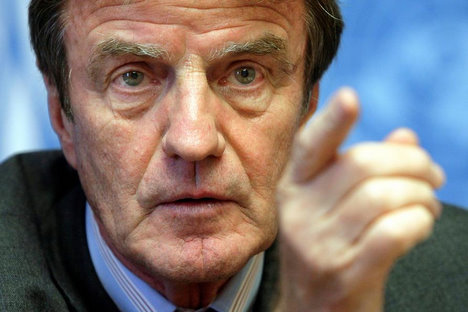
EU’S French Presidency Rushes Partnership Talks with Moscow
Publication: Eurasia Daily Monitor Volume: 5 Issue: 209
By:

In St. Petersburg on October 28 French Minister of Foreign Affairs Bernard Kouchner gave the green light for a quick resumption of EU-Russian negotiations on a new partnership agreement. Kouchner spoke on behalf of the European Union’s French presidency and was flanked in St. Petersburg by the EU’s foreign and security policy high representative, Javier Solana, who is also pressing within the EU for fast-tracking the partnership talks with the Kremlin. The two held talks with Russian Minister of Foreign Affairs Sergei Lavrov in St. Petersburg.
Kouchner’s words attempted to suggest a fait accompli. “I can tell you that negotiations on a new partnership agreement will be able to go ahead” as early as November 13 and 14 at a summit of EU and Russia in the French town of Nice, Kouchner told the press (Agence France Presse, Interfax, October 28, 29).
The EU’s 27 member countries had, however, decided at their September 1 summit to postpone those talks because of Russia’s invasion of Georgia and occupation of that country’s territories. Under the decisions at that summit, the EU was to have reviewed Russia’s compliance with the French-brokered armistice in Georgia before deciding on that basis whether the resumption of partnership talks with Russia at the Nice summit was warranted or not.
No such review or determination is known to have been carried out by the EU, however; and no decision seems to have been made in the consensus-based EU that would have authorized the French presidency to jump-start those partnership talks without discussion and agreement among the member countries.
The French presidency’s move, therefore, would seem to be an attempt to hijack EU policy. French President Nicolas Sarkozy apparently acted in a national, rather than EU, capacity by authorizing Kouchner to make this move. To be sure, a number of EU governments and influential figures favor a quick start to partnership talks with Russia as a goal in itself, scarcely affected by Russia’s behavior. The French presidency’s move, however, short-circuited those EU member countries that hold a different view of this issue.
The French-led move even undercuts the agreements that Sarkozy had made in August and September, on the EU Presidency’s behalf, with Russian President Dmitry Medvedev to implement the armistice in the Russia-Georgia war. Kouchner’s move seems practically to abandon the EU policy, which was basically to postpone the start of the partnership negotiations until Russia implemented the armistice in Georgia. The EU as such, however, never made a decision to abandon that approach nor could it have, given the situation on the ground in Georgia.
Moscow has breached the French-brokered armistice on multiple counts. Instead of withdrawing its forces to the lines they held prior to August 7, Russia has: introduced massive additional forces into Abkhazia and South Ossetia; announced plans to maintain and expand Russian military forces and bases in both of those territories; seized areas that Tbilisi had controlled prior to August 7 in both of those territories; and forcibly evicted the Georgian population from the newly seized areas (upper Kodori and a part of South Ossetia).
Acting beyond the text of the armistice, Russia has “recognized” Abkhazia and South Ossetia (a thin cover for their annexation) and on that basis refuses to admit the European Union’s Monitoring Mission (EUMM) into the two territories. Moscow has begun playing a cat-and-mouse game with the EUMM, alleging that it falls short of “guaranteeing” Abkhazia and South Ossetia protection from Georgian “provocations.” The EUMM chief, German diplomat Joerg Haber, has replied with diplomatic understatement that those allegations are “slightly exaggerated” (Interfax, October 28; EUObserver, October 29).
Moscow is similarly barring access to the UN and OSCE missions, unless the three missions negotiate for access with the Abkhaz and South Ossetian authorities. This tactic is designed to extort some form of incipient recognition of the secessionist authorities. With the same goal in mind, Moscow blocked the start of international negotiations on security and stability on October 15 in Geneva (which the Sarkozy-brokered armistice had envisaged), because the Abkhaz and South Ossetian authorities had not been accorded the status of full participants there.
Regardless, the EU’s French presidency seems eager to return to business as usual with Russia. Hence, the presidency is attempting to break the linkage between Russia’s observance of the armistice in Georgia and the EU’s go-ahead to negotiations on a partnership agreement with Russia. The German and Italian governments, among others, are pulling in the same direction. On the other hand, the British, Swedish, Polish, Czech, and Baltic governments want that linkage to be maintained and the idea of partnership with Russia to be evaluated in light of Russia’s behavior.
Beyond the immediate issue, the larger stake in this debate involves policy-making within and by the EU. The French presidency is now attempting to circumvent the procedures by tinkering with EU institutions and suggesting various formulae for directory-type bodies—even devices to prolong the French presidency’s powers in the EU during 2009—that would risk dividing the EU.




